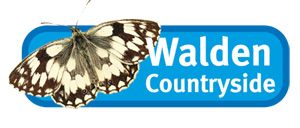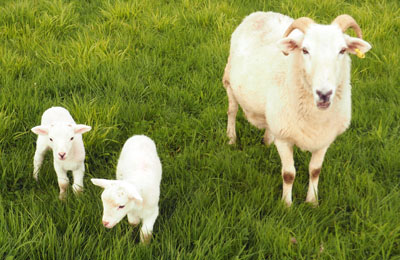The Ram
No sheep likes living alone but most of the year the ram has to be kept away from his harem. Our ram has Amy as a companion - she is sterile and so can live year round with the ram.
The ram will spend a few weeks in November with the breeding ewes. Usually ewes have one or two lambs in spring (April or May). After a few years we need to sell our ram and buy a new one - this is to avoid the old ram getting his own daughters pregnant.
The Noakes Grove flock is registered with the official Wiltshire Horn Sheep Society. Our original ewes were born in April 2009, the lambs are usually born in late April or early May. They are enclosed in paddocks so they can be moved to new parts of the meadow, while the part they have left recovers and any parasites they have left in the soil are given time to die. Natural parasite control is very important as we try to avoid chemical treatments.
Wiltshire Horns are one of the traditional English breed approved by Natural England for additional Environmental Stewardship grant-aid. they have two big advantages over many modern breeds: the sheep can live out year round and do not have to be shorn. the wool is moulted naturally every year, so they have a permanent fairly short fleece and are much less likely to get "fly strike" problems than sheep with thick coats of wool.
The sheep are visited at least once a day to see that all is well, top up their water pots and give extra food in winter or when the ewes are feeding young lambs. These routine visits are done by a team of volunteer shepherds and shepherdesses (and their children) who live near by and any of whom can call in expert help if the need arises. We are very grateful to the current members of our Noakes Grove and Kings Field sheep teams.
|



